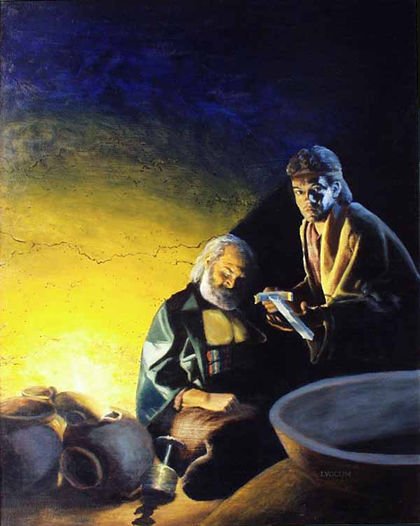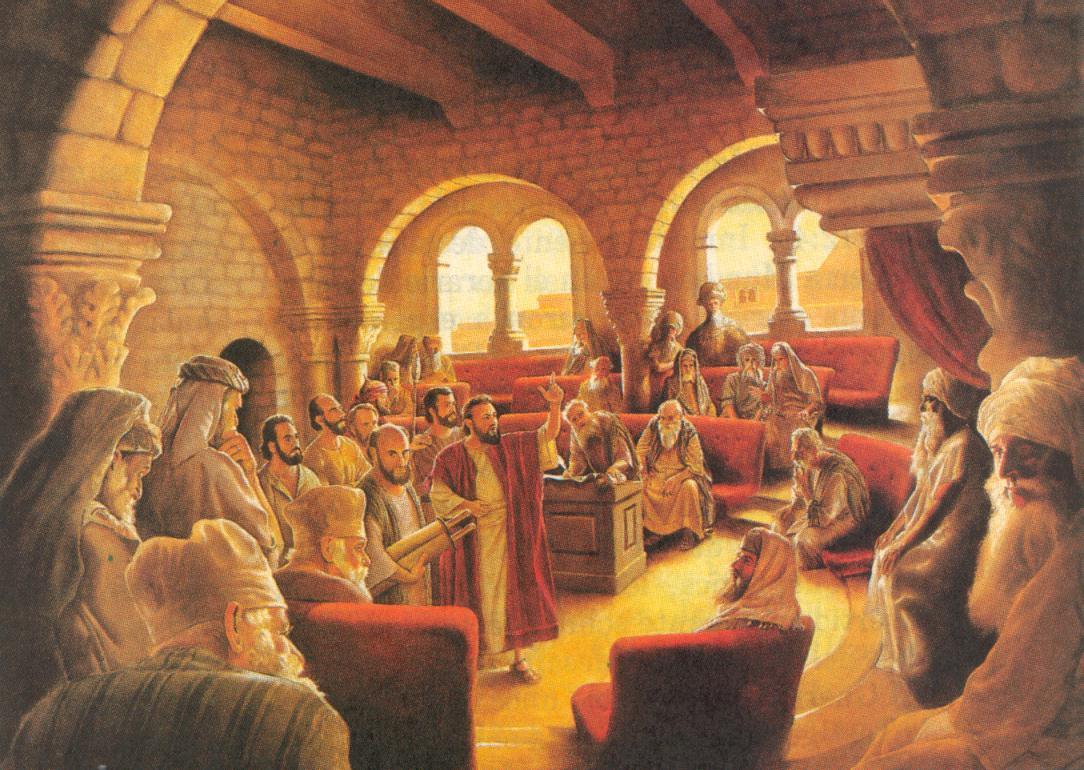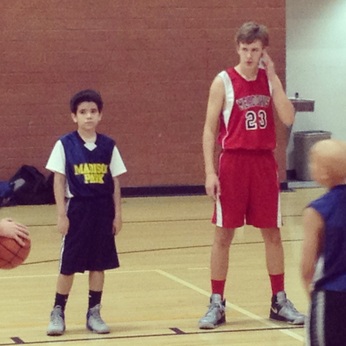|
|
|
|
 CHAPTER 4
CHAPTER 4Nephi slays Laban at the Lord's command and then secures the plates of brass by stratagem—Zoram chooses to join Lehi's family in the wilderness. [Between 600 and 592 B.C.] |
Nephi slays Laban, the Captain of fifty of the Sarim, the elders of the Church. He obtains the brass plate record of the house of Joseph. Zoram, the servant keeper of the records, chooses to join Lehi's party. [About 600-590 B.C.] | |
|
1 AND it came to pass that I spake unto my
brethren, saying: Let us
go up again unto Jerusalem, and let us be afaithful in
keeping the commandments of the Lord; for behold he is mightier than all the
earth, then why not bmightier than
aLaban and his
fiftya, yea, or even than his
tens of thousandsb?
2 Therefore let us go up; let us be astrong like unto Moses; for he truly spake unto the waters of the Red bSea and they divided hither and thither, and our fathers came through, out of captivity, on dry ground, and the armies of Pharaoh did follow and were drowned in the waters of the Red Sea. 3 Now behold ye know that this is true; and ye also know that an aangel hath spoken unto you; wherefore can ye bdoubt? Let us go up; the Lord is able to cdeliver us, even as our fathers, and to destroy Laban, even as the Egyptians. 4 Now when I had spoken these words, they were yet wroth, and did still continue to murmur; nevertheless they did follow me up until we came without the walls of Jerusalem. |
1a Laban and his fifty The
position of Laban is supported by a number of hints.
That he commands fifty suggests that he is a Captain of fifty, an official
position. But as to military strength, to command fifty is not much, however
Laban commands fifty in the city. Now is Laban associated with the military,
the King or some other force? Since Laban associates with the 'elders of
the Church' dressed in his full official armor, does suggest that this is
the body which the captain does serve. This group would be the ruling
'sanhedrin' of the city of Jerusalem, they who had sought with authority the
live of Lehi previously just as they had done with Christ. There are differing
names by which such 'elders of the Church' may be addressed. In the day of
Christ they were the Sanhedrin who did rule the people by the Law of Moses.
In the Book of Jeremiah, he persistently calls them the princes. They held
their own councils and trials of the people and they had their own enforment
body. Whether these enforcing officers where considered to be 'of the Temple'
of by some other name, since they would enforce the Law of Moses, it was an
enforcing body much associated with the religious law of the Temple. Laban
was such an officer, a 'Captain of the Temple', he headed the enforcing
officers of the 'Sarim', the princes, priest and elders of the Church. When
on understands Laban's standing as that ruling officer of the 'temple police'
over the people, one comes to understand that Laban was a most powerful and
most feared man of power over the people of the Jews. 1b his tens of thousands Though Laban was a most powerful 'police' captain of the city of Jerusalem, Nephi extends the position of 'captain' to a military sense and even if Laban where the captain of tens of thousands, the Lord would still have power of him. This further comparative analysis of Nephi helps solidify that Laban indeed was a 'Captain' in his appointed office. |
1a
TG
Courage;
TG
Dependability; TG Faithful b 1 Ne. 7:11; TG God, Power of 1a Isa. 3:3 (1-3); Jer. 34:20 (18-20); Acts 4:1 (1-3); John 18:3; Matt. 26:47; Mark 14:43 Luke 22:52; Acts 5:24 2a Deut. 11:8; Prov. 24:10 (10-12) b Ex. 14:21 (18-30); Josh. 2:10; 1 Ne. 17:26; Mosiah 7:19 3a 1 Ne. 3:30 (29-31); 1 Ne. 7:10 b TG Doubt c TG Deliverance |
|
5 And it was by night; and I caused that they should hide themselves without the walls. And after they had hid themselves,
I, Nephi, crept into the city and went forth towards the house of Laban.
6 And I was aled by the Spirit, not bknowing beforehand the things which I should do. 
8 And when I came to him I found that it was Laban. 9 And I beheld his asword, and I drew it forth from the sheath thereof; and the hilt thereof was of pure gold, and the workmanship thereof was exceedingly fine, and I saw that the blade thereof was of the most precious steel. |
6a
TG
Guidance, Divine; TG Holy Ghost, Gifts of; TG Inspiration b Heb. 11:8 7a TG Drunkenness 9a 2 Ne. 5:14; D&C 17:1 |
|
Law Concerning Thieves ~ Justifiable HomicideThe question is freqently considered by what right did Nephi take Laban's life. True God commanded it but still by what law did Laban loose his life? Now the law concerning thieves or robbers is this, "If a theif be found breaking up, and be smitten that he die, there shall no blood be shed for him." (Exodus 22:2) Loosely interpreted in two contexts this means that a thief caught if smitten and dies then there is no attoning blood to offered to forgive him of that act. This is one context. Another context is that there was no sin commited in smiting or slaying the thief so that he dies. And therefore for the one who did smite him and did kill him, there is no guilt upon him at least if the man were truly a thief. Laban had used this law in the justification of his intended murders of the sons of Lehi. He had declared them 'thieves' and had sent his servants after them to slay them. If Laban's servants had caught Lehi's sons and killed them then the law would have justified Laban for he had killed but those who were thieves and robbers. It did not matter that Lehi's sons where innocent, the presumption would be that they were but theives and had been slain as such. This was a 'loophole' which presumes the honesty of men, but if used by a dishonest and bloodthirsty person, would allow them to commit murder undetected.Now in truth Lehi's sons were not thieves. Laban had made a false accusation but who would question Laban, a Captain of the Sarim, the Sanhedrin of his day? Cerainly the Sarim or elders of the Church, those noble princes and rulers of the Jews would not question Laban, as it was they who had sought to kill Lehi in the first place. Of course in all actual fact it was Laban who was the thief having robbed Lehi's sons of all the family's great weath.Thus the question becomes, with Laban being a theif, did not the law justify Nephi in smiting Laban for the robbery of their property? The answer is YES, Nephi was justified by the law. Laban had been caught as a known theif to Nephi that very day. Nephi returned that night to obtain the brass plates and found drunken Laban turned over to his charge. The 'next sun' had not yet risen upon Laban, thus he was still under that time frame which the law provided that if he was smitten and killed, it was justified. Now the law further states: "If the sun be risen upon him, there shall be blood shed for him; for he should make full restitution; if he have nothing, then he shall be sold for his theft." It seems that if the thief was caught alive and time had lapsed that a day or a sunrise had occured since the thieft, then a blood sacrifice to the Lord could be made for the thief and he would have to fully pay restitution or then be sold as a servant/slave for his theft. But Nephi caught/found Laban the thief who robbed him before the next sunrise. Thus Nephi was doubly justified. Not only had God commanded Nephi to smite and slay Laban, but he was justified by the law in still smiting him within the initial time frame of the thieft. He was justified in giving Laban a mighty wack or to smite him, even to cutting off his head. And if the smitten died, there was no sin or sin offering required as it was justified under the law. Argue the morality of it, it was the Law of God and a strong deturant to thieves.
|
||
|
10 And it came to pass that I was aconstrained by
the Spirit that I should kill Laban; but I said in my heart: Never at any
time have I shed the blood of man. And I shrunk and would that I
might not slay him.
11 And the Spirit said unto me again: Behold the aLord hath bdelivered him into thy hands. Yea, and I also knew that he had sought to take away mine own life; yea, and he would not hearken unto the commandments of the Lord; and he also had ctaken away our property. 12 And it came to pass that the Spirit said unto me again: Slay him, for the Lord hath delivered him into thy hands; 13 Behold the Lord aslayeth the bwicked to bring forth his righteous purposes. It is cbetter that one man should perish than that a nation should dwindle and perish in dunbelief. 14 And now, when I, Nephi, had heard these wordsa, I remembered the words of the Lord which he spake unto me in the wilderness, saying that: aInasmuch as thy seed shall keep my bcommandments, they shall cprosper in the dland of promise.
O Ka Aina I Ka Pono "The Life of the Land Is Perpetuated in Righteousness" In 1843, King Kamehameha III spoke these words in a speech July 31, 1843 when the sovereignty of Hawaii was restored unto Hawaii. Previously, as early as 1825, Queen Ke'opuolani spoke these words at her own Christian baptism. Where did the 'concept' first come from? Some ancient Hawaiian traditions, likely mixed with the first Christian's conceptions, states that at one time the Hawaiians worshipped one god. It also speaks of a Godhead comprised of three beings, which the Hawaiians called Kane, Ku and Lono who were of the same nature but they each had their own distinctive attributes. It also speaks of the god who's holy name was too sacred to be mentioned in casual conversation — 'Io. Some of these ancient traditions also speak similiarly concerning the creation, creation of the first man from 'clay' and the first woman created from the side of the man, also the 'temptation' and 'fall' of man. They also speak of Nu'u, the great flood and his wife, and their three sons and their sons wives. They also speak of the 'father of nations', his two sons and that God (Kane) ordered him to go up the mountains and sacrifice one of the sons (the common ancestor to the Polynesians). It also speaks of the one son who had 12 sons and a daughter. It tells how the younger brother was thrown into a pit by his brothers and 'rescued' by his eldest brother. But he was sent to a foreign land where he later saved the lives of his brothers.There is also a tradition of a Polynessian Moses (Kane-apua) and his brother Aaron (Kanaloa) who were involved in many events similiar to those recorded in Exodus. (see article) |
14a had heard these words The inspiration comes in many ways. Often it is an impression, a thought to the mind or an emotion of the heart. At times it comes in a voice that can be audibly heard. It would seem that when the spirit constrained Nephi to kill Laban, Nephi actually heard the voice of God, the voice of the spirit, telling him exact and precise words. While an angel did not appear, Nephi heard the the spirit constraining him verbally and audiably to kill Laban. Such an experience does not often come. And when it does, as Nephi did, one must also reason it out in their mind and still have the confirming impression of the spirit upon them. This Nephi did do. |
10a
1_Sam. 15:3-33 11a Deut. 3:3; 1_Sam. 17:46 (41-49) b 1 Ne. 7:11 c 1 Ne. 3:26 13a Num. 25:17; Deut. 12:29; Ps. 139:19; 1 Ne. 17:37 (33-38); D&C 98:32 (31-32); Jer. 34:20 b TG Justice; TG Punishment; TG Wickedness c Alma 30:47; TG Life, Sanctity of d TG Unbelief, Unbelievers 14a Omni 1:6; Mosiah 2:22; Ether 2:7-12 b TG Commandments of God c 1 Ne. 2:20 d 1 Ne. 17:13; Jacob 2:12
|
|
15 Yea, and I also thought that they could not keep the commandments
of the Lord according to the alaw of Moses, save they
should have the law.
16 And I also knew that the alaw was engraven upon the plates of brass. 17 And again, I knew that the Lord had delivered Laban into my hands for this cause—that I might obtain the records according to his commandments. |
15a
Mosiah 1:5 (1-6) 16a Josh. 1:8; TG Law of Moses |
|
|
18 Therefore I did obey the voice of the Spirit, and took Laban by
the hair of the head, and I smote off his head with his own
asword.
19 And after I had smitten off his head with his own sword, I took the garments of Laban and put them upon mine own body; yea, even every whit; and I did gird on his armor about my loins. |
18a
1 Sam. 17:51 |
|
|
20 And after I had done this, I went forth unto the treasury of Laban.
And as I went forth towards the treasury of Laban, behold, I saw the
aservant of Laban who had the keys of the treasury. And I
commanded him in the voice of Laban, that he
should go with me into the treasury.
21 And he supposed me to be his master, Laban, for he beheld the garments and also the sword girded about my loins. |
20a
2 Ne. 1:30 |
|
|
22 And he spake unto me concerning the aelders of
the Jews, he knowing that his master, Laban, had been out by night
among them.
23 And I spake unto him as if it had been Laban. 24 And I also spake unto him that I should carry the engravings, which were upon the aplates of brass, to my elder brethren, who were without the walls. |
22a
2 Sam. 17:15;
Ezek. 8:1;
Acts 25:15 24a 1 Ne. 3:24 (12, 19-24); 1 Ne. 5:10-22 |
|
|
25 And I also bade him that he should follow me.
26 And he, supposing that I spake of the abrethren of the bchurcha, and that I was truly that Laban whom I had slain, wherefore he did follow me. 27 And he spake unto me many times concerning the elders of the Jews, as I went forth unto my brethren, who were without the walls.
 A sanhedrin court chamber for seventy could be two sets of 3 rows of center split seats of up to 10 per row and a leadership head seating for 10 to also include the High Priest, making a full assembly as many as 71 elders in a feasible room of about 24 feet by 24 feet or the size of a double garage or about half the square/cubic dimensions of a British Parliament chamber. As it was a 'court' the center 'arena' would be for those presenting the case and also attending the court. The above picture is a fair representation while that pictured below was likely an exagerated elaboration.  |
26a supposing that I spake of the brethern of
the church In verse 22, Zoram speaks to Nephi concerning the 'elders of
the Jews' as that was who Laban had been out by night among. In verse 24 Nephi
states that he was taking the plates of brass to his 'elder brethren'. Here
in verse 26, Nephi explains that Zoram supposed that Nephi's reference to his 'elder
brethren' was the 'brethern of the church'. Here it needs to be further
explained that in the time of Zedekiah the 'ruling officials' of the Law of
Moses were those who were of the 'council of seventy' referred to in the time of
Christ as the Sanhedrin. These are also referenced by Jeremiah as the 'princes'
(see such as Jeremiah 38:4). Of course this order of 'seventy' was established by
Moses to aid in the ruling and governing of Israel. And they were powerful enough
that they could even hold a king in judgment according to the Law of Moses. So
when it speaks of the 'elders of the house of Israel' or the 'ancients of the
house of Israel' they are speaking of the 'elders of the church' who administered
the Law of Moses. These were the 'princes' also called the 'sarim', which
is the plural of 'prince', and they were the rulers of the Jews just as the
Sandehrin was in the days of Jesus.
27a he spake unto me many times concerning the elders of the Jews Zoram, Laban's trusted servant who held the keys to the treasury where the plates of brass were kept, supposed that Nephi referenced the 'brethern of the church', 'the elders of Jews' or the council of the seventy who governed the people according to the Law of Moses. These were they who could even influence and rule over the king, even King Zedekiah, and in the book of Jeremiah spoken of as the rulers and princes of the Jews who actually Zedekiah feared and 'could nothing against them' for the 'peer presure' they'd bring (Jeremiah 38:4-5). And what is of some interest here is that Zoram questioned not that Laban would carry the 'record of Joseph', the 'plates of brass', for the 'Sarim' to examine and even perhaps would 'dictate' some additional items to be included therein. Zoram therefore likely could have been also bring with him the engraving tools and he may well been the 'servant of Laban' who actually enscribed onto the plates of brass and a logical and even needful addition to the party of Lehi. |
26a
Ex. 2:11;
Num. 18:6;
2 Sam. 19:41 b TG Church Organization
|
|
28 And it came to pass that when Laman saw me he was exceedingly frightened, and also Lemuel and Sam. And they fled from before
my presence; for they supposed it was Laban, and that he had slain me and had sought to take away their lives also.
29 And it came to pass that I called after them, and they did hear me; wherefore they did cease to flee from my presence. 30 And it came to pass that when the servant of Laban beheld my brethren he began to tremble, and was about to flee from before me and return to the city of Jerusalem. 31 And now I, Nephi, being a mana large in stature, and also having received much astrength of the Lord, therefore I did seize upon the servant of Laban, and held him, that he should not flee.
|
31a I, Nephi, being a man When Nephi had departed with his family from Jerusalem into the wilderness just a couple of years earlier he describes himself as being 'exceedingly young'. Now about two years later, Nephi states that he is a 'man'. From the age of about 10 to the age of 12 in a Hebrew boy's life he begins to mature and the Hebrew law trains the boy in the ways of being a man. At age twelve, during the thirteenth year of life the Hebrew male has his 'barmetzvah', his coming of age. He is then considered a 'man' in Israel. It would not be surprising for Nephi, now age 12 to refer to himself as a man, in fact it would be what he was expected to do. Further, Nephi had just performed what would have made a man out of any number of innocent youths. He had beheaded Laban, and taken upon himself the mantle of a man perhaps symbolized by the armor of Laban. |
31a
TG
Strength;
TG
Strengthen   |
|
32 And it came to pass that I spake with him, that if he would hearken unto my words, as the Lord liveth, and as I live, even so
that if he would hearken unto our words, we would spare his life.
33 And I spake unto him, even with an aoath, that he need not fear; that he should be a bfree man like unto us if he would go down in the wilderness with us. |
33a
2 Sam. 21:7;
TG
Oath b TG Free |
|
|
34 And I also spake unto him, saying: Surely the Lord hath
acommanded us to do this thing; and shall we not be
diligent in keeping the commandments of the Lord? Therefore, if thou wilt go
down into the wilderness to my father thou shalt have place with us.
35 And it came to pass that aZoram did take courage at the words which I spake. Now Zoram was the name of the servant; and he promised that he would go down into the wilderness unto our father. Yea, and he also made an oath unto us that he would tarry with us from that time forth. 36 Now we were desirous that he should tarry with us for this cause, that the Jews might not know concerning our flight into the wilderness, lest they should pursue us and destroy us. |
34a
1 Ne. 2:2;
1 Ne. 3:16 35a 1 Ne. 16:7; 2 Ne. 5:6 (5-6) Jacob 1:13; Alma 54:23; 4 Ne. 1:36-37 |
|
|
37 And it came to pass that when Zoram had made an
aoath unto us, our bfears did cease
concerning him.
38 And it came to pass that we took the plates of brass and the servant of Laban, and departed into the wilderness, and journeyed unto the atent of our father. |
37a
Ex. 22:11 (10-11);
Josh. 9:19 (1-21); TG Oath; TG Vows b TG Trustworthiness 38a 1 Ne. 2:15 |
|
| Commentary Home | 1 Nephi Home | 1 Nephi 3 | 1 Nephi 5 |